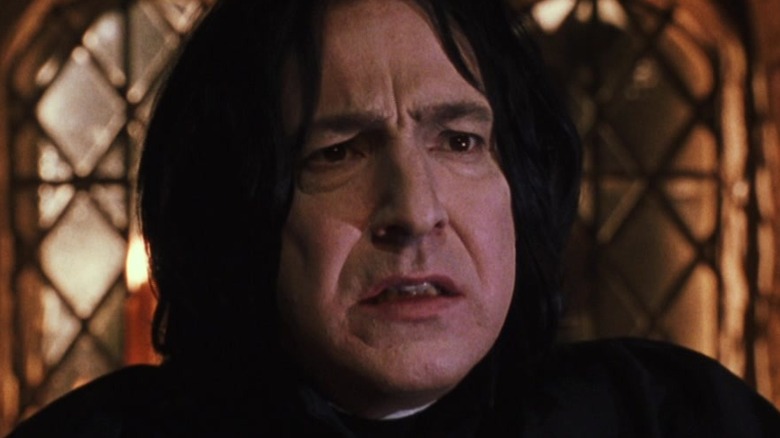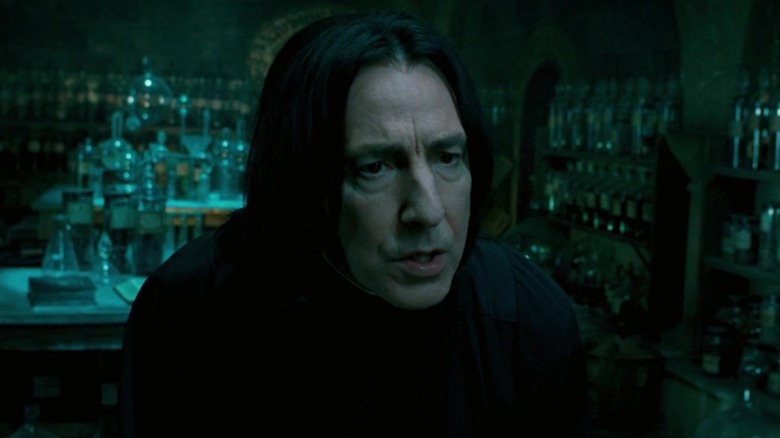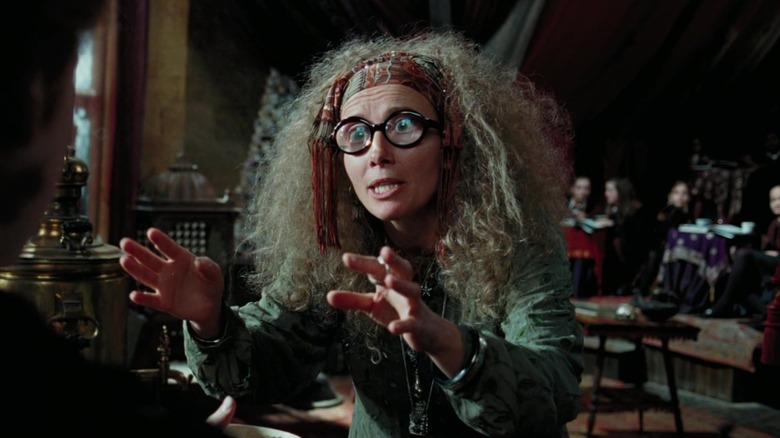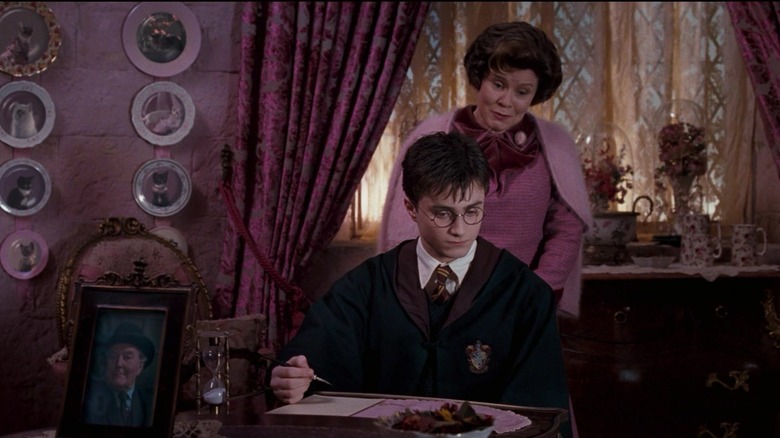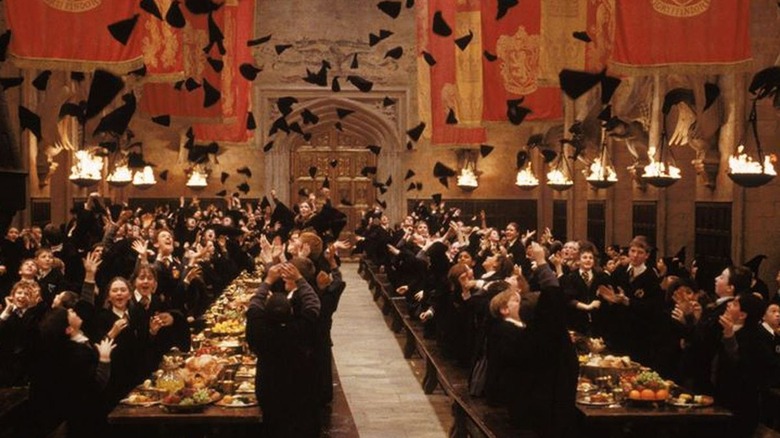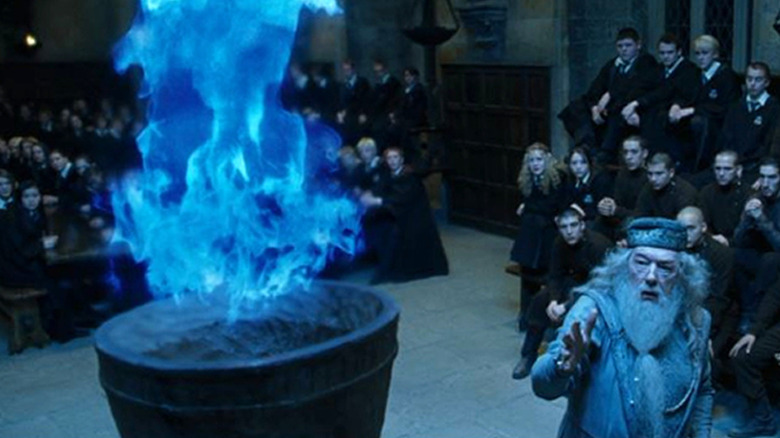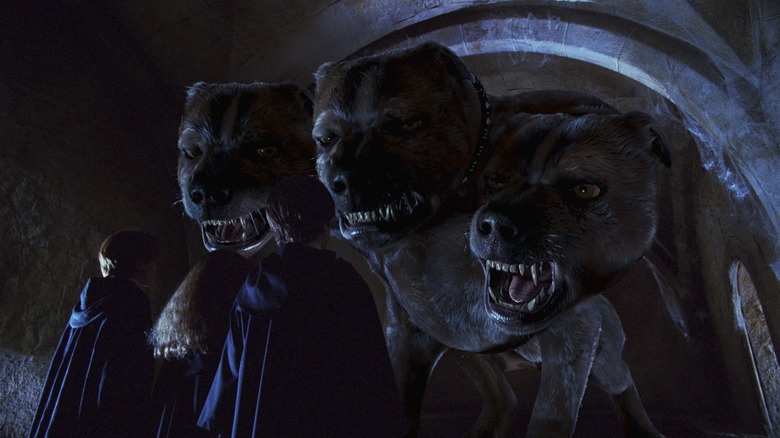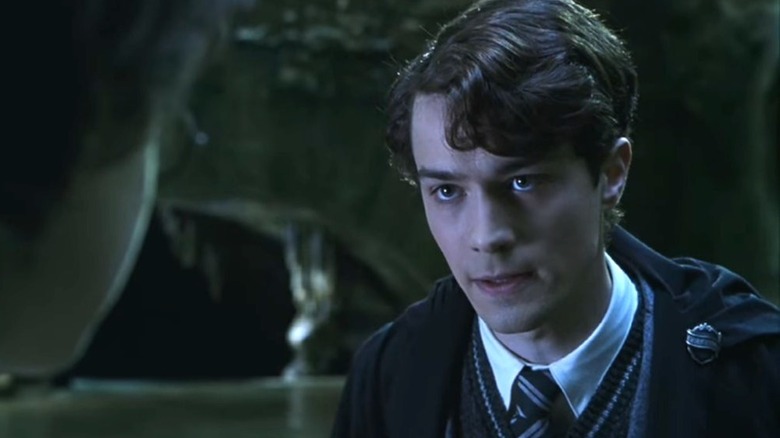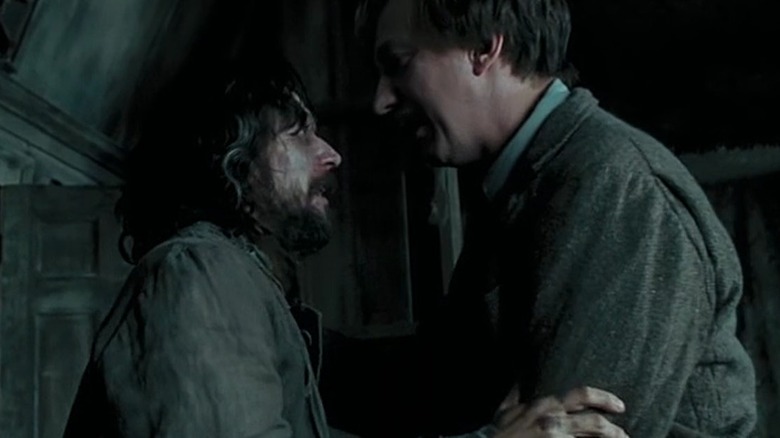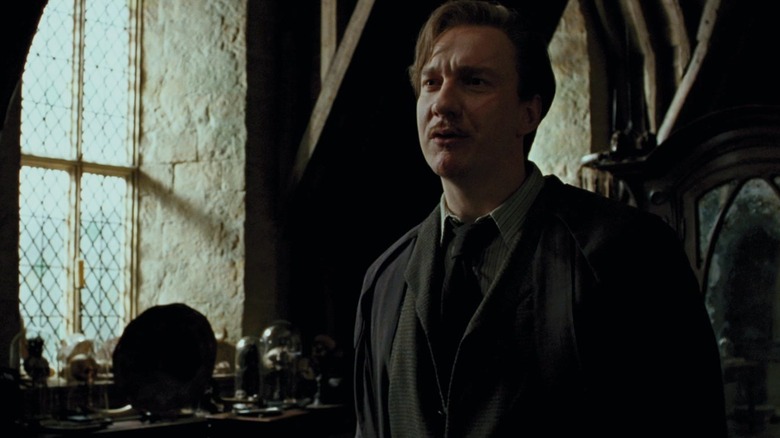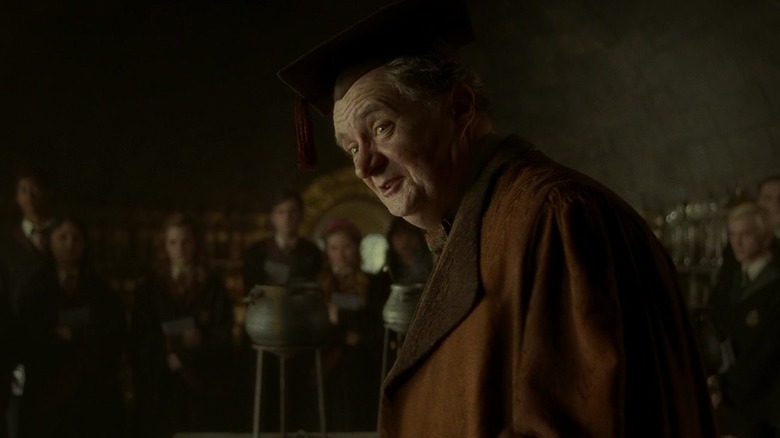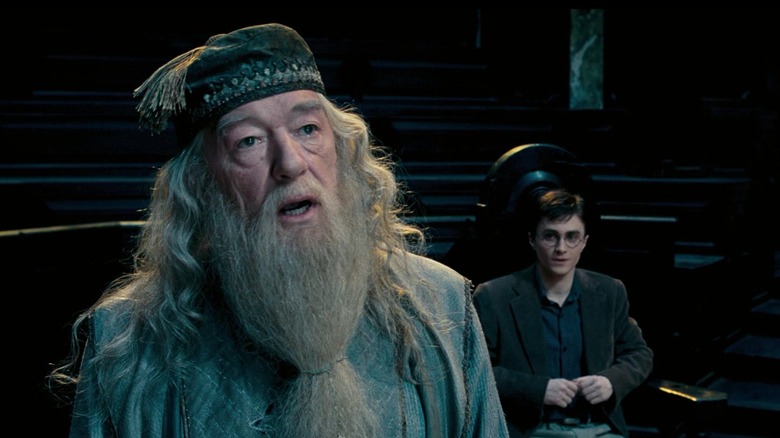Questionable Things We Ignore About Hogwarts Professors
When kids watch the "Harry Potter" movies, it's easy to get swept up in the glitz and glam of Hogwarts' magical moments without realizing just how shady its professors can be. While the Hogwarts employee motto hinges on the fact that there's no safer place than Hogwarts, the high injury and death tolls tell a different story. When it comes to magic, it's no surprise that young kids wielding this power would get themselves into a fair amount of trouble, but it's up to their more experienced mentors to create — at the very least — a safe learning environment.
However, negligence runs rampant in all areas of the Hogwarts staff, and it's unclear how some professors (we're looking at you, Snape) manage to keep their jobs. Despite severe cases of bullying, favoritism, an inability to handle students, and putting children into dangerous situations, the Hogwarts professors leave a lot to be desired. Sure, we all anxiously waited for a Hogwarts letter on our eleventh birthdays, but it certainly isn't the safest place, and some might have left in a body bag. Did you notice any of these less than favorable characteristics regarding Hogwarts' finest?
Snape is a power-seeking bully
Former Death Eater or not, seeking out a job working with children to procure the power you never had as a kid isn't a cute or defensible move. Fans tend to give Severus Snape a pass on his abhorrent behavior as a teacher because he turns on Voldemort to become a double agent for Dumbledore. Yet his motives to betray Voldemort have little to do with nobility. Snape was angry that Voldemort killed Lily after he was all too happy to let James and Harry die to snag the one that got away for himself — that's not love. Maybe at one point, Snape unselfishly loved Lily, but even after her death, he treats her son like garbage. Just because he saves his life a few times doesn't excuse bullying a child because he looks like his dad.
And it's not just Harry that Snape lords over like a classroom bully who's still reliving his glory days. Neville's boggart proves that he's more afraid of Snape than the woman who tortured his parents into insanity — which is horrifying, to say the least. Despite the fandom's romanticization of Snape, his few heroic moments and his obsession over a woman who told him "no" don't erase his cruelty toward his students.
Even worse, no other professors seem to care enough to stop him. Of course, his actions don't stop him from being a fascinating and well-developed character; we just don't need to pretend that he's flawless romantic goals.
Trelawney intentionally manipulates her students
As far as Sybill Trelawney knows, she's a quack. Yet that doesn't stop her from tearing down her quizzical and questioning students. By Dumbledore's estimations, Trelawney has made precisely two real predictions during her tenure at Hogwarts: The prophecy regarding Voldemort's vanquisher and the "Prisoner of Azkaban" prophecy where she predicts the rise of Voldemort. Sure, other vague declarations from the descendant of the great seer Cassandra Trelawney have come to pass. However, most can be attributed to parlor tricks based on observations — or vague enough to come true for anyone.
Given that Trelawney doesn't even remember her actual predictions, she's either an intentional fraud who likes to toy with her students for dramatic effect, or she's convinced herself to believe her own mind games. Either way, she treats her students like pawns in a metaphysical experiment. Most disturbingly, she picks a student every year to predict their death and torment them with tales of misfortune. Of course, she picks Harry — an orphaned kid who already feels like a death magnet — to terrify all year despite him already freaking out over the fact that Sirius Black seems to want him dead.
The seer also emotionally abuses Hermione just because she's a bit of a know-it-all. Calling a student's soul as dry as a book is pretty gross. If your student questions the legitimacy of your subject, you don't lash out and eviscerate their self-confidence — they're children. Be an adult.
Students get esoteric and dangerous punishments
Apparently, the Forbidden Forest is only forbidden when professors aren't hosting detention in the dangerous woods. In "The Sorcerer's Stone," Harry, Ron, and Hermione get caught out of bed when Malfoy snitches on them. Instead of doing something normal like writing lines, the four students get separated into groups to hunt down a unicorn killer. Harry and Malfoy don't even get supervision in the haunted forest at night when there's an immortality-seeking evil creature on the loose. Meanwhile, Hagrid gives a spiel on how twisted you have to be to hunt down a unicorn and that he's always suspected Voldey would try to return. The fact that he still forces Harry Potter to traipse in the woods seems like a lapse in judgment.
The forest isn't the only esoteric punishment at the castle, though. Professors frequently force students to spend hours cleaning the castle, and Filch reminisces about the good old days when he got to hang students up in the dungeons. Of course, there's also Dolores Umbridge, who enjoys making students write lines that get carved into their skin with a sick quill. A charming slate of staff, huh?
House favoritism is real
With the level of House favoritism Hogwarts professors exhibit when they award or detract points for the House Cup, the tradition is all but rigged. Snape is less than subtle about his determination to detract every possible point from Gryffindor while awarding Slytherin points whenever he can — and he's not the only one. A few professors like McGonagall seem to keep things fair, but even she shows her Gryffindor cards on occasion.
However, Dumbledore wins the House Cup for the worst case of points tampering we've ever seen. It's bad enough when professors dole out unfair points throughout the year, but Dumbledore needs to make a whole dramatic show of things. Even in "Sorcerer's Stone," Gryffindors are dead last until Dumbledore baits and switches the celebrating Slytherins by publicly awarding Harry a bunch of points for straight-up murdering Quirrell, Ron for playing a great game of overdramatic chess, Hermione for being a cool witch, and Neville for standing up to his friends.
Of course, he does this after announcing Slytherin as the winner. Does anyone else think the Slytherins are always so pissy because the headmaster of the school literally pits every house against them?
Let's throw students into a death match for fun
In the Hogwarts professors' quest to put their students in as much peril as wizardly possible, they put on a dangerous and occasionally deadly international tournament between teenaged martyrs. Despite the original Triwizard Tournament's demise due to the death of teenagers, wizard schools including Hogwarts, Durmstrang, and Beauxbatons decide that it's a swell time to bring the tradition back in "Goblet of Fire."
Based on what we know, it doesn't seem like the professors or headmasters do a single thing to make it safer this go-around — and what do you know? Cedric Diggory pays the price with his life. Sure, having three international schools compete in a tournament to learn about different cultures and gain new experiences is a great idea. However, there doesn't need to be a death component with dragons and other dangerously unpredictable tasks to do so.
The tournament also leads to Dumbledore's most out-of-character moment in the film. He shoves Harry and asks, "Did you put your name in the Goblet of Fire?!" Despite his outrage in the movie, Dumbledore already knows that Harry isn't advanced enough to fool the Goblet's age barrier in the book. Suffice to say, it's not one of Dumbledore's best moments from the films, and the tournament is just as deadly as it was in years past because the professors couldn't keep a tighter watch on things.
Professors let students fight their battles
With a headmaster as old Dumbledore (we're talking around 115), you'd think that he'd be more than willing to take the lead on any investigative work when all is not well at Hogwarts. Yet no matter how many times Harry, Ron, and Hermione bring serious situations to their attention (like someone trying to steal the Sorcerer's Stone), they brush it off. In the end, the educators always leave a bunch of kids to do the dirty work of Hogwarts' negligent professors.
The Hogwarts teachers openly let their students fight their battles while rarely lifting a finger to handle situations themselves. Why? Because of their ego trip, of course. If they haven't noticed anything themselves, how on earth could something possibly be funky? One time would be more than enough, but even Hogwarts' best professors like McGonagall gaslight students about any serious concerns without ever doing anything substantial. When it comes to the final battle, the students are somehow still taking charge when many of the remaining professors don't do all that much to help out. Just look at the death toll of students compared to professors. There are far too many crises at the school, to begin with, but why is there rarely a professor around when shady wizard drama is going down?
Do they have background checks in the wizarding world?
When teachers begin hearing about curses surrounding open positions at Hogwarts, it makes sense that it's a little challenging to find competent and caring educators to fill a void. Despite Voldemort cursing the Defense Against the Dark Arts position, Dumbledore still does little to no vetting when he fills the open position, nor does he offer to teach it himself. Instead, he continually hires incompetent or straight-up evil wizards to teach the school's most important subject while failing to look into counter curses and long-term solutions actively.
As it stands, we've got professors dying, some acting as Voldemort's right-hand face, and a wizard who obliviates iconic wizards to steal their life story, to name a few. It's wild that Dumbledore is supposed to be the greatest wizard in his time, yet he can't be bothered to lift a curse or come up with a clever way around it. The school is full of magical professors. Why can't they all portkey to another school for Defense Against the Dark Arts class? If another school teaches the class, they could circumvent the curse. When there's a wand, there's a way, right? Dumbledore would rather hire a slew of incompetent teachers than exercise the creativity he supposedly has — and many people die because of it.
Hell, Cedric Diggory would still be alive if Dumbledore instilled some anti-polyjuice potion measures to prevent identity theft in a magic school. Something as simple as a weekly, "Tell me something only [insert professor name here] would know" measure would work.
There's no place less safe than Hogwarts
The professors continually say that Hogwarts is the safest place in the wizarding world — but that assumption is precisely what causes them to frequently put students' lives in danger by being complacent. Hiding a three-headed dog and the Sorcerer's Stone in the castle was a major lack of judgment call that the Hogwarts professors continuously repeat without learning their lesson.
Sirius Black manages to infiltrate the school, Peter Pettigrew runs around as the Weasleys' rat for years, and Death Eaters can stroll in whenever they want. If an old map that a bunch of mischievous kids created can detect someone who's supposed to be dead, why aren't more measures like that taken by actual professors? For an impenetrable school, a whole lot of devious wizards manage to infiltrate. How is this a safe school, and why aren't the professors and its headmaster taking these breaches in security seriously? How many students have to die before professors stop toting the "there's no safer place" tagline and actually pay attention to what's happening around them? If Harry Potter — the world's most oblivious wizard — notices a problem when the teachers don't, that's definitely a red flag.
Even the repetition of tragic historical events goes unbothered by the staff. At the first sign of the Chamber's reopening, the school should be evacuated — let alone after multiple petrified students. One wrong glance, and the school would have a dozen more Moaning Myrtles. It's a miracle it takes so long before parents start pulling their kids from school.
A werewolf shouldn't hang out at school on a full moon
Sure, Remus Lupin is hands-down the school's most competent Defense Against the Dark Arts teacher we see throughout the series, but why is he left to howl at the moon on Hogwarts grounds at all? Having the guy hide in a tree during full moons when he turns into a werewolf in a castle full of students is questionable judgment at best. Even worse, Dumbledore knows that the DATDA position wields a pretty nasty curse, yet he allows a werewolf to hang out on the grounds during full moons? Does Dumbledore actively want his students to die or get mauled?
Lupin's lupine characteristics certainly aren't his fault, but for a couple of days out of the month, he shouldn't be anywhere near students — especially not when the ever-vindictive Snape is in charge of his docile potion. During transitions, he should be in a safe, secluded space to protect himself and everyone around him. Instead, both he and Dumbledore leave things to fate and misplaced trust in a tree shack, and Harry and his friends almost die for it. Lupin's situation is quite tragic given how little control he has over his own body, but that doesn't excuse him from bearing the responsibility of ensuring his students' safety before he turns each month and loses all will.
Slughorn uses his students' clout to feed his ego
The bar is pretty low for Hogwarts professors, but even educators like Slughorn, who were employed long before Voldemort's curse, leave a lot to be desired. Sure, Slughorn is competent when you measure him alongside the dude who wears Voldemort as a fashionable headpiece, but on his own, he's a pretty awful teacher.
Slughorn uses his students to feed his narcissism, taking credit for their accomplishments and displaying them in his classroom like trophies that he personally won (ew). He even creates a creepy elite club for his star students (or anyone with notable parents or the fame of the chosen one). Okay, we get it, Hogwarts' abysmal safety track record makes open positions difficult to fill (especially when so many professors get injured or killed on the job), but you can't just hire terrible people because you can't fill a position. Even Slughorn himself doesn't want to take the job. Someone really needs to assist Dumbledore on the hiring process because this just isn't working out.
Dumbledore raises Harry for the slaughter
Albus Percival Wulfric Brian Dumbledore made an alarming number of mistakes and oversights during his time at Hogwarts. Still, none are quite as sinister as what he does to the wizarding world's golden boy Harry Potter. In his calculated quest to defeat Voldemort, Dumbledore raises Harry to be a martyr for the slaughter while never being honest with him and putting him in grave danger annually in favor of being cryptic.
Harry risks his life time and time again to fix the mistakes of the negligent Hogwarts staff, yet even when Dumbledore takes him on perilous Horcrux missions, Dumbledore still keeps the young wizard in the dark. Harry has more than proven that he's willing to put his life on the line to protect others, so it's both unnecessary and cruel that Dumbledore expects him to walk into danger blindly without the information and tools Dumbledore has at his disposal.
It's frankly a shock that Harry lives long enough to carry out Dumbledore's plan to die to kill the last Horcrux, given how much danger he put him in beforehand. It's also a miracle that our ever-oblivious Boy Who Lived found the Horcruxes in the first place with little to no help from Dumbledore. But either way, Harry deserved to know what he was walking into, and if he did, he wouldn't have made any different choices — Dumbledore would just be giving him the respect of informed decisions.
